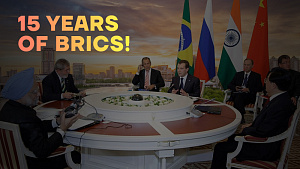The term BRIC is derived from the initial countries forming the association, namely Brazil, Russia, India, and China. In 2011, South Africa’s inclusion led to the new name, BRICS. The group expanded further on January 1, 2024, to include Egypt, the United Arab Emirates, Iran, Saudi Arabia, and Ethiopia.
The first BRIC meeting occurred on September 20, 2006, and was attended by Russia, Brazil, China, and India’s foreign and defense ministers, respectively. The ministers agreed to foster multifaceted cooperation among their countries. The association’s inaugural full-scale summit took place on June 16, 2009, in Yekaterinburg, Russia. The summit included notable figures such as Russian President Dmitry Medvedev, Brazilian President Luiz Inacio Lula da Silva, Indian Prime Minister Manmohan Singh, and President of the People’s Republic of China Hu Jintao. They discussed various international issues, including the reformation of international financial structures, energy development, climate change, and food security.
Within the BRICS structure, the country that organizes the annual summit chairs the association and coordinates all its ongoing activities. Each summit is a crucial step toward bolstering multifaceted cooperation and strengthening the group’s role and significance on the global stage.
The 6th summit, held in Fortaleza, Brazil in 2014, was a particular milestone with the signing of the agreement to establish the BRICS New Development Bank. This important step aimed to strengthen financial stability and infrastructure development within the member countries. Another significant meeting was the 7th summit hosted by Ufa, Russia, where the Ufa Declaration was signed. This declaration marked a shift towards trades in national currencies within BRICS and an agreement on cooperation between member states until 2020.
The 15th BRICS Summit in Johannesburg in 2023 saw the association’s expansion, with Argentina, Iran, Ethiopia, Egypt, Saudi Arabia, and the United Arab Emirates given the right to join the association. However, Argentina chose not to join the group. As of January 1, 2024, the other five countries officially became members of BRICS.
The BRICS summit in Kazan, Russia in 2024 saw the first meeting of the enlarged membership and dozens of leaders from partner countries. More than 200 events were also organized by Russia, who held the BRICS chairmanship that year. Furthermore, more than 40 states have expressed interest in joining the association, including Colombia, Turkey, Belarus, Thailand, Venezuela, and Sri Lanka.
Sergey Ryabkov, the Russian Deputy Foreign Minister and Russia’s Sherpa for BRICS stated, “The summit in Kazan marks new highs in the interaction among BRICS countries. I am pleased to see the friendly cooperation among all participants, working towards results, without imposing anything on anyone.”
